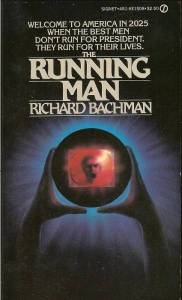Can You See Me Running? by Bev Vincent
One of the interesting things about researching these historical context essays is that they demonstrate how unreliable memory can be. Contradictions abound. For example, depending on which account you believe, The Running Man was written either before Stephen King started Carrie or immediately after he completed that book’s first draft, which would make it either his fourth or his fifth finished novel manuscript.
 The Running Man was written in the “winter of 1971,” which some sources assign to the period between Christmas and New Year’s Day. King remembers writing it during February vacation, which would place it in February 1972.
The Running Man was written in the “winter of 1971,” which some sources assign to the period between Christmas and New Year’s Day. King remembers writing it during February vacation, which would place it in February 1972.
Sources generally say that King wrote the novel in a weekend or, more specifically, over a period of 72 hours. In a 2013 interview in The Guardian[1], King says he wrote it in a week. “I was white hot, I was burning. That was quite a week, because Tabby was trying to get back and forth to Dunkin’ Donuts and I had the kids. I wrote when they napped or I would stick them in front of the TV. Joe was in a playpen. It seemed like it snowed the whole week, and I wrote the book.” As with the other novels from that time, King says it was written “by a young man who was angry, energetic, and infatuated with the art and the craft of writing” in a “Bachman state of mind: low rage and simmering despair.” » Read more
 When I was a teenager, I spent several summer vacations working a government job at nearby Aberdeen Proving Grounds and Edgewood Arsenal. My duties ranged from laying asphalt to landscaping to pulling up old railroad tracks to shredding government documents.
When I was a teenager, I spent several summer vacations working a government job at nearby Aberdeen Proving Grounds and Edgewood Arsenal. My duties ranged from laying asphalt to landscaping to pulling up old railroad tracks to shredding government documents. I couldn’t wait to read the Bachman books. By that time I was rereading the early Stephen King bestsellers simply because I needed a fix. I am of the age when realistic fiction was the standard form of the masters. In my top ten of novels is In Dubious Battle by John Steinbeck. And the first trilogy I ever read was Studs Lonigan by James T. Farrell. Proletarian fiction if you will.
I couldn’t wait to read the Bachman books. By that time I was rereading the early Stephen King bestsellers simply because I needed a fix. I am of the age when realistic fiction was the standard form of the masters. In my top ten of novels is In Dubious Battle by John Steinbeck. And the first trilogy I ever read was Studs Lonigan by James T. Farrell. Proletarian fiction if you will.